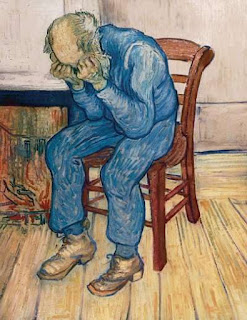I believe that human suffering is not the ultimate evil. It is not the thing we should most ardently avoid or prevent.
What is? Human comfort.
This position was clarified for me by an episode of The West Wing. I was a huge West Wing fan. That show may have been the best-written television program of all time. In Episode 127, "A Good Day", Congressman Matt Santos leads a clandestine scheme to vote down Republican legislation that would cancel funding for stem cell research. To defeat the bill, he has to convince a freshman Democrat of the value of stem cell research. He does so by appealing to "the greater good". He tells the freshman that millions of lives might be spared suffering if we use a few lives to prevent it. The trade-off is worth the cost.
I remember sitting in silence for a long time after that episode, trying to decide if Matt Santos was right. If human suffering is the ultimate evil, then we should do all we can to prevent or reverse it. The meaning of life becomes a numbers game in which we measure suffering (Willing to trade one million more ulcers in exchange for 100 fewer cancers?) and work the solution that ensures the least.
But I think that's a fearful and myopic approach to life. And though I loved the West Wing scripts, I often disagreed with the worldview from which they were written.
So what is the ultimate evil? Meaninglessness.
In his book Don't Waste Your Life, John Piper equates ultimate evil with ultimate waste. He recalls reading a story in Reader's Digest that told of a couple who seemed to embody the American Dream. They "took early retirement from their jobs in the Northeast five years ago when he was 59 and she was 51. Now they live in Punta Gorda, Florida, where they cruise on their 30-foot trawler, play softball and collect seashells."
Piper cajoles:
Come to the end of your life — your one and only precious, God-given life — and let the last great work of your life, before you give an account to your Creator, be this: playing softball and collecting shells. Picture them before Christ at the great day of judgement: "Look, Lord. See my shells." That is a tragedy.
Ultimate evil is not human degradation but human exaltation — not when we are forced against our will, but when our will succumbs to force.
When the Holocaust hero Father Maximilian Kolbe redeemed his suffering by trading his life for that of another prisoner, he ensured that his life was not wasted and his suffering not victorious. He turned evil to good. In fact, the setting for greatest evil was transformed to good by his chosen suffering.
But of course there were others in those prison camps — and in every kind of prison since then — who did not suffer well, who considered their own comfort or deliverance the highest cause.
We are most noble and most good and most God-like when we, in fact, choose suffering for another's sake — when we run toward the burning building, when we don't love our lives so much as our humanity. We are most evil when we love ourselves highest and look out for number one until it kills us.
Don't get me wrong; I'm not looking for any opportunities to suffer, and I believe God is grieved by human injustice. Humans are icons of God, and when they suffer injustice, God is mocked. But a belief system in which human suffering is the ultimate evil is one in which human comfort is the ultimate good. That's humanism or consumerism. It's not Christianity.


No comments:
Post a Comment